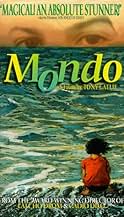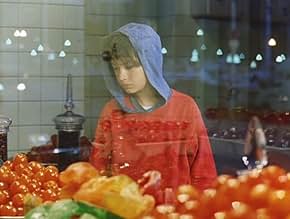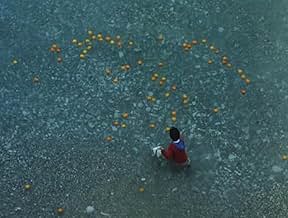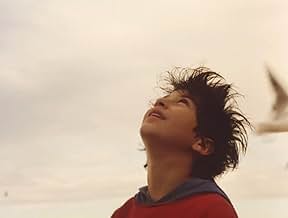Ajouter une intrigue dans votre langueMondo is a homeless young boy, with a big smile, who wanders around Nice looking for food and a place to sleep.Mondo is a homeless young boy, with a big smile, who wanders around Nice looking for food and a place to sleep.Mondo is a homeless young boy, with a big smile, who wanders around Nice looking for food and a place to sleep.
- Réalisation
- Scénario
- Casting principal
- Récompenses
- 1 victoire au total
Avis à la une
10Anglik
Throughout this movie experience - which moved me to tears several times - I had an extraordinary feeling that I was watching an adaptation of "Le Petit Prince" ("The Little Prince") by Antoine de Saint-Exupéry. Even though the film is set in a different time and place, and its main characters and plot line are not really in sync with the story of a boy from another world, there is, at the same time, a strange affinity here with de Saint-Exupéry's timeless classic. As we watch the peculiar odyssey of a little Mondo - a boy with no home, no family, no past, no memory almost, and no real skill apart from smiling wide joyful grins and opening his heart to strangers - we have no other choice but to fall in love with this little homeless adventurer, this modern Gavroche, who seems almost mythical in the way he turns up in the midst of people's lives to touch them, move them, perhaps change them - for a couple of days, or forever.
Heartily recommended to all those who embrace cinema as a way of channeling emotions, rather than notions and philosophical ideas, through images. "Toujours beaucoup".
Heartily recommended to all those who embrace cinema as a way of channeling emotions, rather than notions and philosophical ideas, through images. "Toujours beaucoup".
Ovidiu Balan, playing a homeless Gypsy boy, made this movie worth seeing. The movie, in itself, is visually stunning. More of a video documentary than anything, it has very little dialogue....and maybe that's a good thing. Words get in the way sometimes.
From what I have heard, Ovidiu Balan is not French and was deported after the making of the movie.
From what I have heard, Ovidiu Balan is not French and was deported after the making of the movie.
This little-known film turned out to be a gem.
Mondo is a young vagrant boy living in Nice. He is free-spirited, joyful and does what he wants, with nobody telling him what to do. He would spend time walking the streets of Nice, go for a swim in the sea or join a lonely fisherman on the pier. Mondo is mostly met with a lot of goodwill. He would get cuts of freshly baked bread from the kind lady at the bakery, or fresh fruit from the open-air market. Mondo has many friends; we see him joining a beggar who has a suitcase with two beloved white doves, and meeting a busker whose effort he assists by passing his money collecting plate around. Then there is the childless Vietnamese lady who takes Mondo in and cares for him when he falls sick.
The antagonists in the story are 'welfare' officials who are out to capture Mondo and take away his freedom. In a disturbing allegory we witness how other officials catch stray dogs to take to the pound. Would Mondo escape the officials and retain his freedom?
Mondo seems mythical; he may not even be real. The film subtly compares the cost of conformity with that of freedom and individuality.
This film superficially may seem to be thin on the plot, but believe me, it is not a simple as it seems. Watch it carefully; it has a lot to offer below the surface.
This film speaks to the senses. The sound of a knife cutting through a crusty loaf of bread, the soothing splash of swells lapping against the side of a boat. Excellent cinematography accentuates the visual. A few memorable scenes: Rainwater collecting on a water-lily leaf; a wet but seemingly happy Mondo sheltering from the rain whilst a bedraggled and soaked dog in the next scene looks everything but happy; an insect moving to the sheltered side of a leaf as the rain continues. A small boat pulling against its mooring in the ebb of the tide. And then there is the surreal scene of oranges, with messages written all over them, washing up onto the beach. The attention to detail is remarkable. The soundtrack is excellent too.
'Mondo' reminds me of the importance of appreciating the world around us for what it is, uncluttered by preconceptions or indifference.
The young actor who plays Mondo, Ovidiu Balan, does so with distinction. The performances by the other actors (Philippe Petit, Schahia Aalam, Pierette Fesch, Jerry Smith and Maurice Maurin) are excellent too. The director, Tony Gatlif must be commended for producing this rewarding and splendid meditative work of art.
I score 'Mondo' a well-deserved 9/10.
Mondo is a young vagrant boy living in Nice. He is free-spirited, joyful and does what he wants, with nobody telling him what to do. He would spend time walking the streets of Nice, go for a swim in the sea or join a lonely fisherman on the pier. Mondo is mostly met with a lot of goodwill. He would get cuts of freshly baked bread from the kind lady at the bakery, or fresh fruit from the open-air market. Mondo has many friends; we see him joining a beggar who has a suitcase with two beloved white doves, and meeting a busker whose effort he assists by passing his money collecting plate around. Then there is the childless Vietnamese lady who takes Mondo in and cares for him when he falls sick.
The antagonists in the story are 'welfare' officials who are out to capture Mondo and take away his freedom. In a disturbing allegory we witness how other officials catch stray dogs to take to the pound. Would Mondo escape the officials and retain his freedom?
Mondo seems mythical; he may not even be real. The film subtly compares the cost of conformity with that of freedom and individuality.
This film superficially may seem to be thin on the plot, but believe me, it is not a simple as it seems. Watch it carefully; it has a lot to offer below the surface.
This film speaks to the senses. The sound of a knife cutting through a crusty loaf of bread, the soothing splash of swells lapping against the side of a boat. Excellent cinematography accentuates the visual. A few memorable scenes: Rainwater collecting on a water-lily leaf; a wet but seemingly happy Mondo sheltering from the rain whilst a bedraggled and soaked dog in the next scene looks everything but happy; an insect moving to the sheltered side of a leaf as the rain continues. A small boat pulling against its mooring in the ebb of the tide. And then there is the surreal scene of oranges, with messages written all over them, washing up onto the beach. The attention to detail is remarkable. The soundtrack is excellent too.
'Mondo' reminds me of the importance of appreciating the world around us for what it is, uncluttered by preconceptions or indifference.
The young actor who plays Mondo, Ovidiu Balan, does so with distinction. The performances by the other actors (Philippe Petit, Schahia Aalam, Pierette Fesch, Jerry Smith and Maurice Maurin) are excellent too. The director, Tony Gatlif must be commended for producing this rewarding and splendid meditative work of art.
I score 'Mondo' a well-deserved 9/10.
I thought it was great when the old man was teaching Mondo to spell with letters scratched onto rocks and Mondo scooped up all the letters in his name and carried them off in his pockets. There's something about a name, isn't there? --
Mondo is based on a short story by French author J.M.G. Le Clézio. The story is the first in a collection of stories about children. In each narrative a child is in some way alienated from the dominant culture while at the same time embodying something that this culture is missing.
In Gatlif's retelling, Mondo is alienated by the busy consumer society of Nice, France: he is always hiding from city officials who try to arrest him and he feels ill-at-ease in the bustling downtown area. He makes his home among the other marginalized Niçois: the homeless, foreigners, gypsies, etc. Gatlif artfully frames the life of Mondo and his friends and makes the viewer feel sympathy for society's rejects.
Gatlif shows how Mondo changes people who let him into their lives while demonstrating the blindness of government agencies that deal with stray children.
An excellent film. Even my children love it.
In Gatlif's retelling, Mondo is alienated by the busy consumer society of Nice, France: he is always hiding from city officials who try to arrest him and he feels ill-at-ease in the bustling downtown area. He makes his home among the other marginalized Niçois: the homeless, foreigners, gypsies, etc. Gatlif artfully frames the life of Mondo and his friends and makes the viewer feel sympathy for society's rejects.
Gatlif shows how Mondo changes people who let him into their lives while demonstrating the blindness of government agencies that deal with stray children.
An excellent film. Even my children love it.
Meilleurs choix
Connectez-vous pour évaluer et suivre la liste de favoris afin de recevoir des recommandations personnalisées
Détails
- Date de sortie
- Pays d’origine
- Site officiel
- Langue
- Aussi connu sous le nom de
- モンド
- Lieux de tournage
- Sociétés de production
- Voir plus de crédits d'entreprise sur IMDbPro
- Durée1 heure 20 minutes
- Couleur
Contribuer à cette page
Suggérer une modification ou ajouter du contenu manquant


















